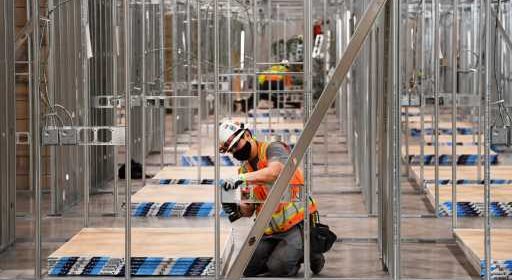Inside the Colorado Convention Center’s transformation into an emergency coronavirus hospital

Standing in the cavernous Colorado Convention Center that normally hosts enormous trade shows and sci-fi conventions, Gov. Jared Polis on Friday explained how the building in the heart of Denver will soon become a temporary hospital with up to 2,000 beds for new coronavirus patients, as the state readies for potential surge in the coming weeks.
“I don’t expect this facility will ever have to be full,” Polis said at a news conference, with a hardhat on his head and a cloth mask around his neck. “Unfortunately, I also don’t expect it will be completely empty.”
The convention center will be used as a step-down facility, he said, where hospitals would free up needed space by sending patients there for continued care after they’re no longer in critical condition. It will not be open to walk-ins.
More than 300 workers are building beds, hundreds of which should be ready for patients, if needed, by April 18, Polis said. The state plans to use six exhibit halls, featuring hospital pods made of steel frames with drywall.
In about a 72-hour span, Colorado will have done contract and design work on this massive project. The design work alone for a project this size could take two years under normal circumstances, said Lt. Col. Larry Dale Caswell, an Albuquerque-based district commander for the U.S. Army Corps of Engineers.
“It’s a fairly incredible pace,” Caswell said.
The plan is to have one nurse for every 20 patients, Caswell said, but the temporary hospital will still need volunteers — some medically-trained and others who are not. Some of the volunteer work could include running to a pharmacy and back to buy needed items for patients.
As convention center work ramps up, officials also are scrambling to ready the Budweiser Events Center in Loveland, which will also be used as a temporary hospital. The build-out of that facility is a couple days behind the convention center, Caswell said, but it will be designed in similar fashion. Capacity will be slightly lower than Denver’s, and will accept the same type of non-critical patients from hospitals, he said.
An official price tag is still being worked out, though it could run in tens of millions of dollars, Caswell said. The governor’s office was not immediately able to provide a cost estimate, or details on who’s paying for this work.
When the city might need the convention center remains to be seen.
Denver hospitals have 92 of their 334 intensive care beds available as of Thursday, according to the city’s status report, while 255 of the city’s 344 ventilators were still unused.
The numbers of available hospital beds and ventilators fluctuate on a daily — if not hourly — basis.
The state has been scrambling the past few weeks to prepare for the surge in patients expected, looking into arenas, dorm rooms and event spaces to house sick people in the event hospitals are overwhelmed. On Thursday, the state’s incident commander for COVID-19 said social distancing and the governor’s stay-at-home order have pushed the state’s peak back into next month at the earliest, a positive sign that the restrictive measures have been working.
Still, Colorado has seen 250 deaths and more than 1,300 people hospitalized from COVID-19, Polis said. Health officials have confirmed 6,510 positive cases, with 32,653 people tested.
Scott Bookman, the incident commander, said Thursday that the state currently has more ventilators than it is using, although the state still believes it will need more for the surge period. A shipment of 100 ventilators promised by President Donald Trump will be available soon, even as Colorado’s Democratic congressional delegation seeks answers as to why a deal for 500 ventilators intended for state hospitals was intercepted by FEMA.
More help could soon be on the way. State health officials on Friday said they have put in orders for $46 million in medical supplies, including orders for hundreds of ventilators and respirators, thousands of face shields and disposable gowns, and millions of masks and gloves. The order marks the first public results from the governor’s Innovation Response Team, which has been working private and public options to find resources to fight the pandemic.
“These are extraordinary efforts in place to effectively deal with a lack of national strategy for the disrupted supply chain that is making it near impossible for acquiring the needed supplies to effectively manage the health crisis,” Bookman said in a news release.
Once the personal protection is tested and approved, it will be distributed to local counties and hospitals based on need, the release said.
With much of the state staying home, Polis on Friday announced a new website, stayathomeco.colorado.gov, designed to provide free support, resources and activities for those with time on their hands. People are encouraged to submit their own resources which could appear on the site, the governor said.
Subscribe to bi-weekly newsletter to get health news sent straight to your inbox.
Source: Read Full Article


